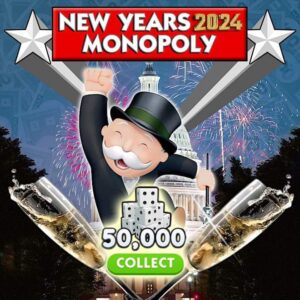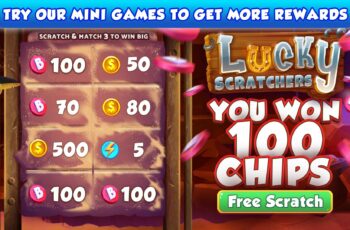
Monopoly, a timeless board game enjoyed by generations, has undergone a digital transformation with the introduction of Monopoly GO. Developed as a mobile gaming experience, Monopoly GO brings the classic property-trading game into the modern era, offering players a chance to engage with the iconic Monopoly board on their smartphones and tablets. In this article, we will delve into the world of Monopoly GO, exploring its gameplay mechanics, digital innovations, social aspects, and the broader impact of adapting a classic board game for the digital age.
The Digital Reinvention of Monopoly
1. Monopoly’s Enduring Legacy
Monopoly has been a household name since its creation in the early 20th century. The board game, known for its strategy, negotiation, and competitive elements, has become a cultural phenomenon. With its classic rendition, players gather around a physical board, buying and trading properties, constructing houses and hotels, and aiming to bankrupt their opponents.
2. Monopoly GO: Bringing the Board to the Digital Realm
Monopoly GO represents a digital reinvention of the classic board game. Instead of relying on a physical board and paper money, players can now experience the thrill of Monopoly on their mobile devices. This adaptation not only preserves the essence of the original game but also introduces new features and dynamics suited for a digital gaming environment.
Understanding Monopoly GO Gameplay
1. Core Monopoly Gameplay Elements
At its core, Monopoly GO retains the fundamental gameplay elements that have made the board game a beloved classic. Players move around the virtual board, buying and trading properties, collecting rent, and aiming to create monopolies to increase their financial dominance.
2. Digital Innovations: Cards and Challenges
Monopoly GO introduces digital innovations that elevate the gaming experience. Instead of physical Chance and Community Chest cards, the digital version incorporates virtual cards that can trigger events, challenges, or bonuses. These dynamic digital elements add unpredictability and excitement to the game.
3. Time-Limited Matches
In contrast to the potentially lengthy sessions of traditional Monopoly, Monopoly GO often features time-limited matches. Players must make strategic decisions within a set time frame, adding a sense of urgency and intensity to each game. This adaptation caters to the fast-paced nature of digital gaming.
4. In-Game Currency and Power-Ups
Monopoly GO may introduce in-game currency or power-ups, allowing players to gain advantages or overcome challenges. These digital enhancements contribute to the game’s strategic layer, providing additional avenues for players to assert their dominance in the virtual real estate market.
Exploring Social Aspects
1. Multiplayer Dynamics
Monopoly GO leverages the connectivity of digital platforms to enable multiplayer dynamics. Players can compete against friends or join matches with opponents from around the world, creating a global community of Monopoly enthusiasts. The multiplayer aspect introduces a social layer, fostering competition and camaraderie.
2. Online Tournaments and Events
To keep the gaming experience fresh and engaging, Monopoly GO often incorporates online tournaments and events. Players can participate in special matches with unique rules, challenges, or themes, adding variety to the gameplay and providing opportunities for additional rewards.
3. Social Integration: Sharing Achievements
Many digital versions of classic board games, including Monopoly GO, integrate social sharing features. Players can share their achievements, high scores, or memorable moments from their games with friends or followers on social media platforms. This integration enhances the social aspect and promotes community engagement.
In-App Features and Monetization
1. In-app purchases and Virtual Goods
As with many mobile games, Monopoly GO often includes in-app purchases as part of its monetization strategy. Players may have the option to buy virtual goods, in-game currency, or access premium features that enhance their gaming experience. This freemium model allows players to enjoy the game for free while providing opportunities for additional investments.
2. Ad-Based Monetization
In addition to in-app purchases, Monopoly GO may incorporate ad-based monetization. Players may be able to watch ads in exchange for in-game currency, power-ups, or other rewards. This model provides an alternative for players who prefer not to make direct purchases but are willing to engage with sponsored content.
3. Subscription Models and Premium Tiers
To offer a more comprehensive gaming experience, Monopoly GO may introduce subscription models or premium tiers. Subscribers could access exclusive content, additional features, or a more immersive gaming environment. These premium offerings cater to players who seek a heightened and personalized experience.
Challenges and Considerations
1. Balancing Digital Dynamics and Classic Appeal
One of the challenges in adapting a classic board game like Monopoly to a digital format is finding the right balance between preserving the classic appeal and introducing digital dynamics. Straying too far from the traditional experience may alienate purists, while sticking too closely to the classic formula may limit the innovation potential.
2. Ensuring Fair and Enjoyable Online Matches
The multiplayer aspect of Monopoly GO introduces challenges related to ensuring fair and enjoyable online matches. Addressing issues such as connectivity issues, matchmaking balance, and preventing unfair advantages becomes crucial to maintaining a positive player experience.
3. Managing In-App Purchases Responsibly
For both players and developers, responsible management of in-app purchases is paramount. Players should be aware of their spending habits, and developers should implement features that encourage responsible gaming, such as spending limits, clear pricing information, and transparent monetization models.
The Future of Digital Board Gaming
1. Integration of Emerging Technologies
The future of digital board gaming, including adaptations like Monopoly GO, may involve the integration of emerging technologies. Augmented reality (AR), virtual reality (VR), and other innovations could enhance the immersive qualities of digital board games, providing players with even more engaging experiences.
2. Cross-Platform Connectivity
As technology advances, seamless cross-platform connectivity may become a standard feature in digital board games. Players could transition between devices, maintaining their progress, achievements, and social connections across various platforms.
3. Continued Evolution of Monopoly and Board Games
The success of digital adaptations like Monopoly GO indicates a continued evolution of board games in the digital space. Developers are likely to explore new ways to enhance gameplay, introduce innovative features, and cater to the diverse preferences of players in the ever-expanding world of digital gaming.
Conclusion
Monopoly GO represents a significant milestone in the digital evolution of classic board games. By bringing the timeless Monopoly experience to mobile devices, the game combines the familiarity of the traditional board game with the advantages and innovations of digital gaming. Whether players are strategizing to dominate the virtual real estate market, competing in online tournaments, or sharing their achievements with friends, Monopoly GO stands as a testament to the enduring appeal and adaptability of a beloved classic in the digital age.
All Link Dailly Update



